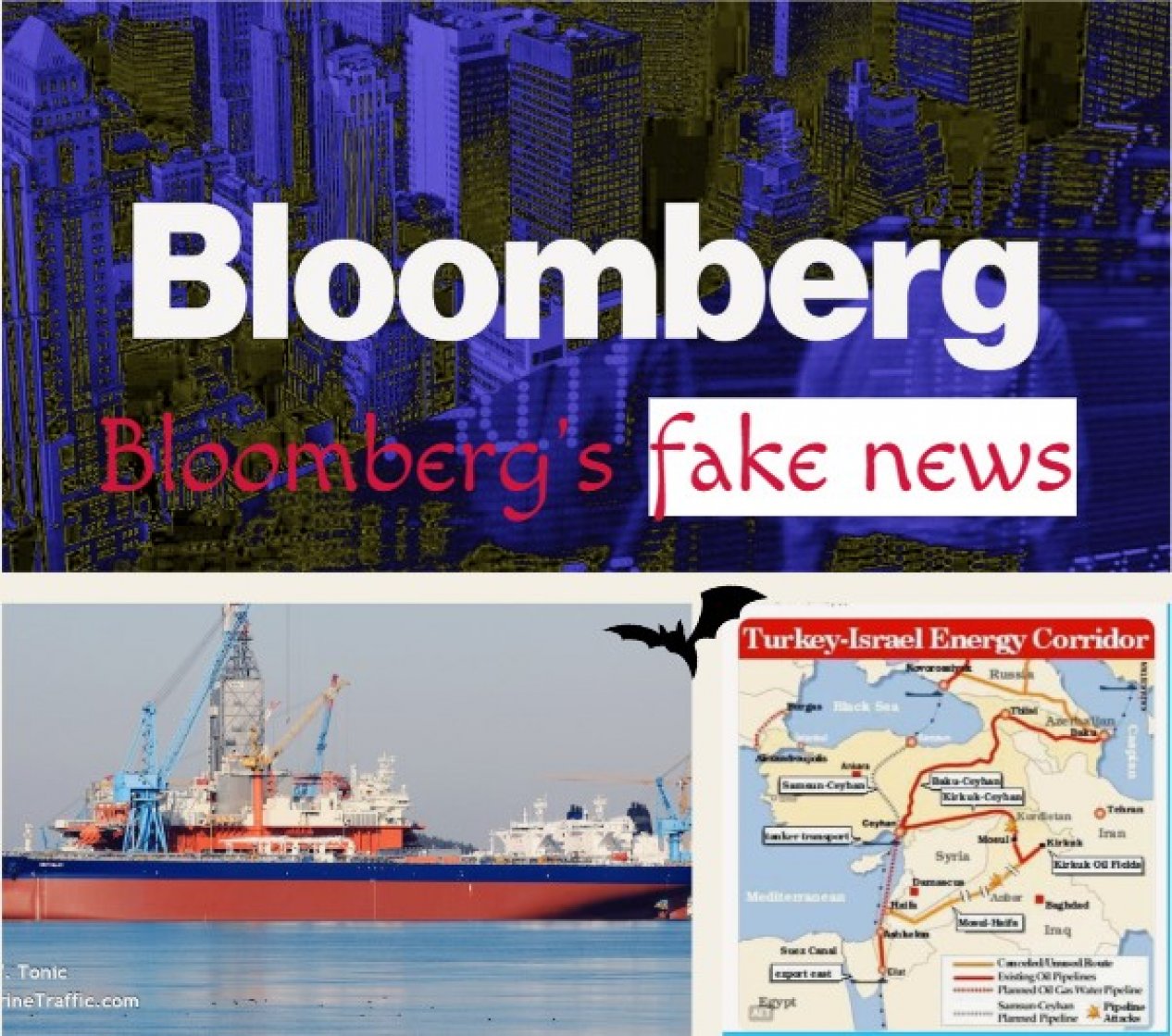
Bloomberg wrote that at a time when Israel was conducting military operations in Gaza, the Seaviolet oil tanker delivered 1 million barrels of Azerbaijani oil from the Ceyhan terminal to the Israeli port of Eilat. The article claims that although the tanker was headed to the Jordanian Aqaba port, it returned to the Israeli port of Eilat on the Red Sea coast to supply the Israeli Paz Oil refinery.
The noteworthy point in this news was that despite the information being spread on October 20, social media users brought the topic up again from October 29 and turned it into a campaign against Azerbaijan and Turkiye.
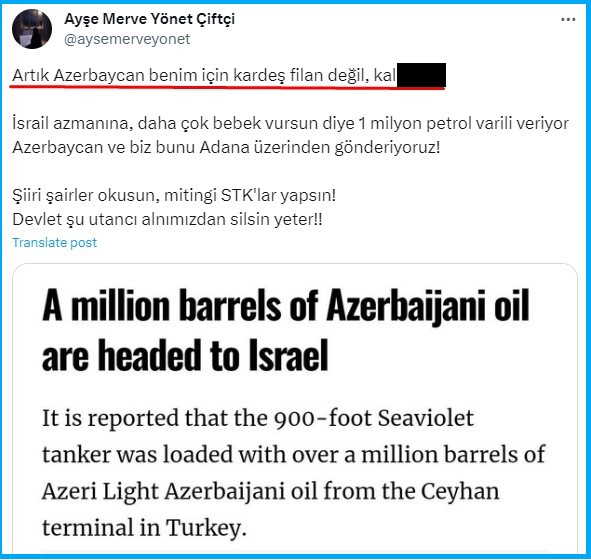
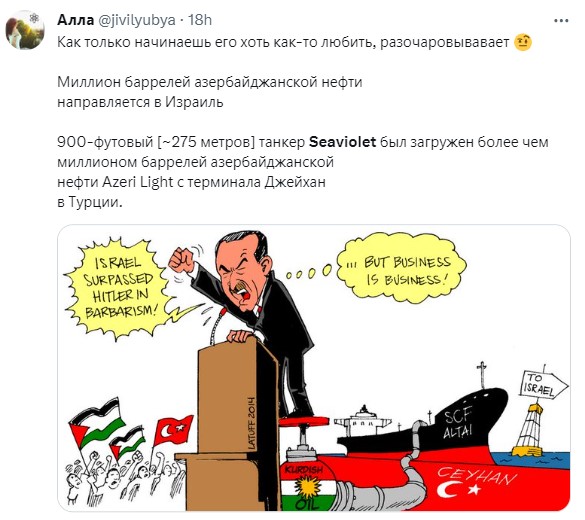
Faktyoxla Lab. (Factcheking Lab.) has investigated these claims.
It turned out that Bloomberg published 2 articles on this topic on October 19 and 20, 2023 (Oil Tanker Sails to Israeli Red Sea Port to Avoid Conflict by Sherry Su and The Desert Pipeline That Ensures Israel Can Keep Importing Oil by Will Kennedy).
The fact is that Bloomberg is a fairly influential media organization, and every word and sentence written by its employees has great influence. That is, the opinions expressed by a reputable media organization should probably be passed on to a wide readership after serious scrutiny. However, when examining these articles, which later caused great resonance in social media, we see that Bloomberg doesn’t follow the usual media ethical rules.
Detail 1. In both articles, only one sentence was posted about the transportation of 1 million barrels of Azerbaijan's crude oil to Israel by the 900-foot (274-meter) Seaviolet tanker.
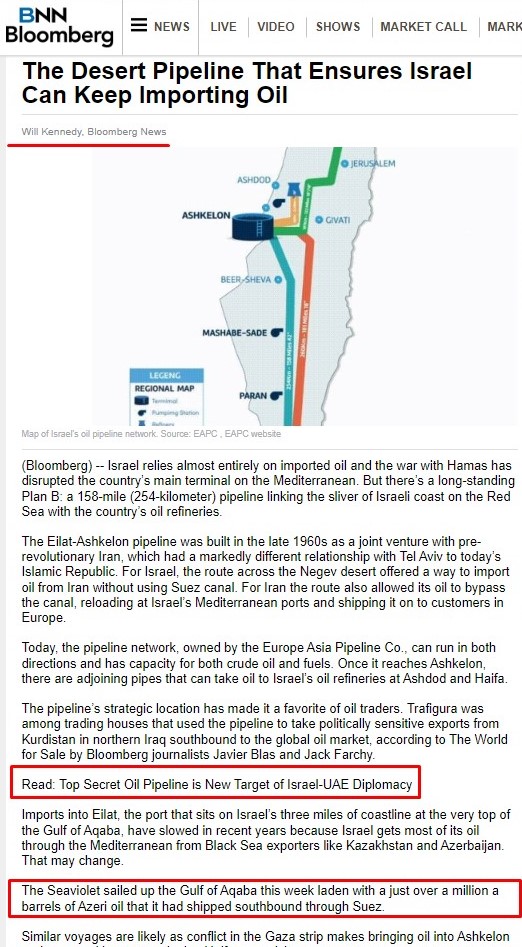
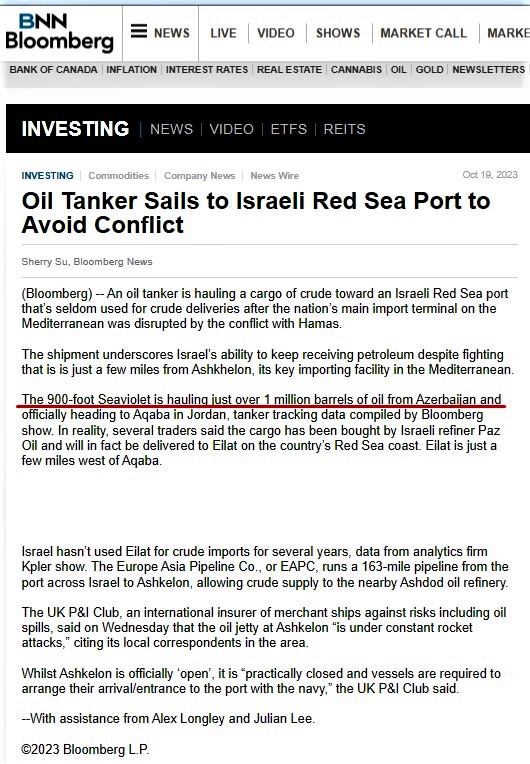
In an article written by Sherry Su on October 20, it was noted: “The 900-foot Seaviolet is hauling just over 1 million barrels of oil from Azerbaijan and officially heading to Aqaba in Jordan, tanker tracking data compiled by Bloomberg show. In reality, several traders said the cargo has been bought by Israeli refiner Paz Oil and will in fact be delivered to Eilat on the country’s Red Sea coast.”
Apparently, such an influential media organization as Bloomberg makes such a serious accusation, referring to "several traders". There is no solid fact, no solid source.
Detail 2. There are several well-known and reliable navigation websites that track tanker and ship movements in the world. The most popular of them are vesselfinder.com and marinetraffic.com.
When examining the trajectory of the Seaviolet crude oil tanker for the last 1 week on the mentioned tanker tracking websites, it becomes clear that the mentioned tanker has never approached the Israeli port of Eilat. First screenshot we provide is footage of tracking as of October 24, 2023:
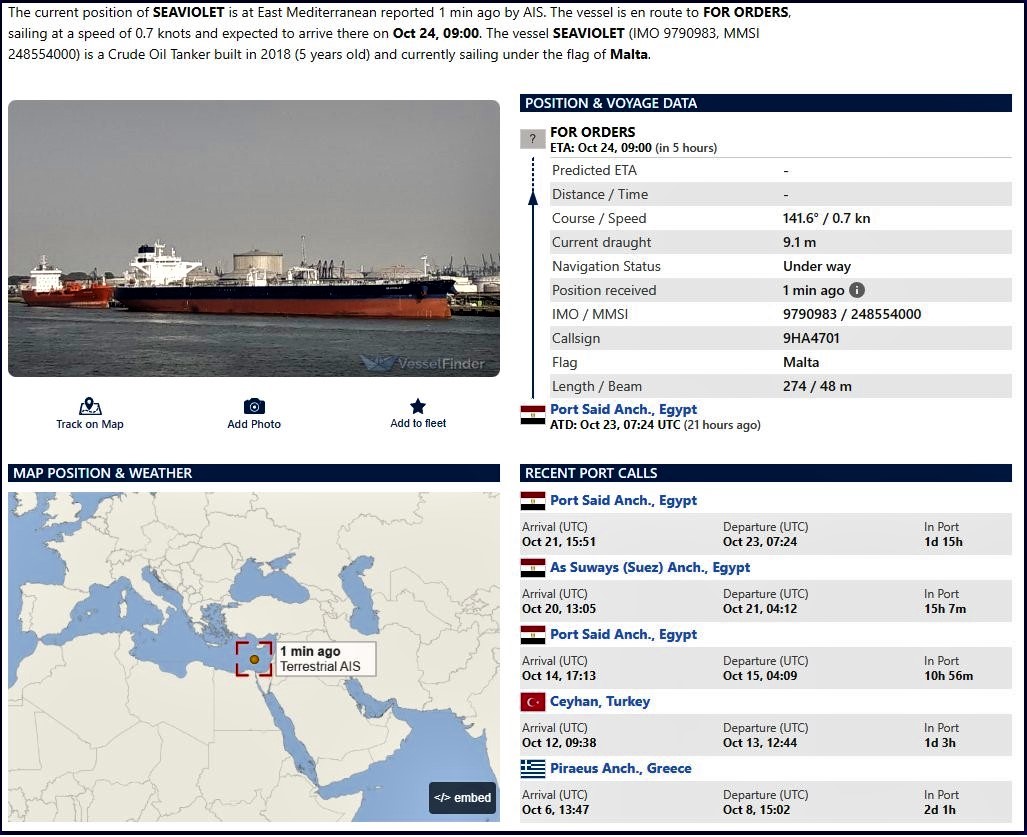
And this is the footage from the second tracking as of October 29, 2023:
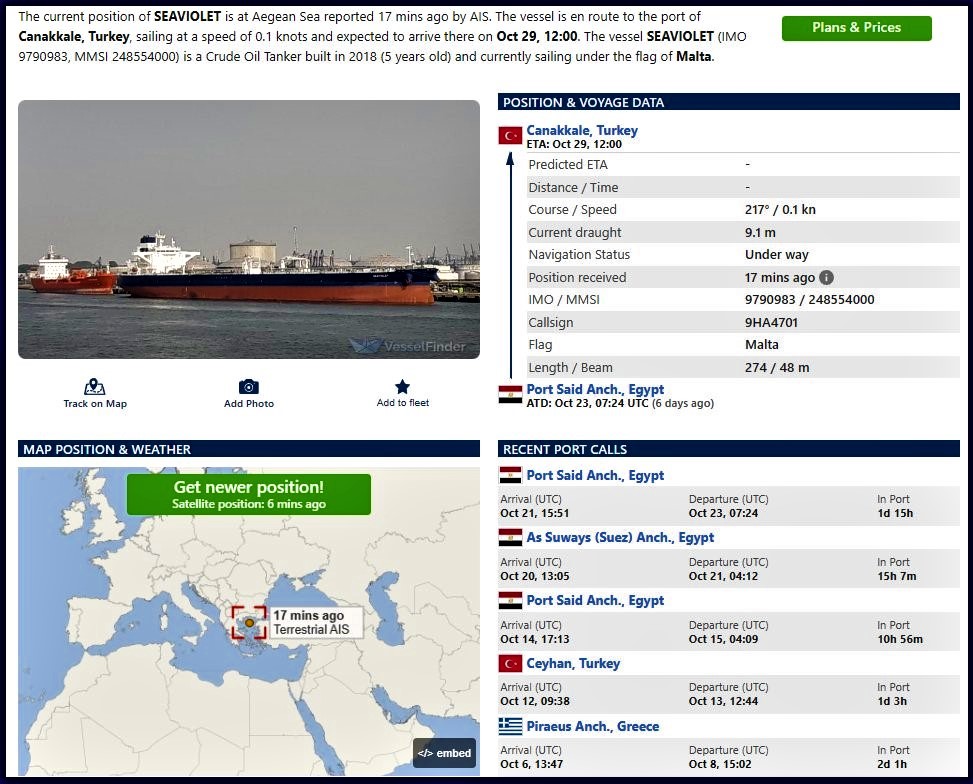
If we pay attention to the schedule, we will see that the ship was in Ceyhan port on October 12, 2023 and left there on October 13, 2023, at 12:44. After that, it arrived at Port Said (departed at 04:09 on October 15) and then at the Suez Canal on October 20 (articles were published on October 19, 2023 at 19:09 and October 20, 2023 at 17:12). What happened after these articles were published? The observed vessel reached the Suez Canal on October 20, 13:05, left the port the next day, October 21, at 04:12, and returned to the Said Port on the same day (October 21, 15:51). Apparently, there is no mention of Jordan's Aqaba Port or Israel's Eilat port.
The third point is regarding "transportation of 1 million barrels of Azerbaijani oil by one tanker."
First of all, the principles of energy cooperation between Azerbaijan and Israel are based on the full economic and commercial legitimacy of oil trade. Since the Baku-Tbilisi-Ceyhan oil pipeline was commissioned (2006) until now, approximately 2-3 million barrels of oil have been supplied to Israel every year. In January-September 2023, Azerbaijan exported 20 million tons, approximately 146 million barrels (7.3 barrels = 1 ton) of oil to 21 countries. The daily export volume (146:274 = 532,000) was 532,000 barrels. Currently, Italy ranks first in exports (7.985 million tons of oil), Israel ranks second (2 million tons (14.6 million barrels), India ranks third (1.2 million tons), Spain ranks fourth (1.1 million tons), Turkiye (1.1 million tons) ranks fifth followed by the Czech Republic, Germany, Croatia, Greece, the UK and other countries. source
During nine months of 2023, Azerbaijan sold 14.6 million barrels of oil to Israel, which means 54,000 barrels of oil per day. That is, 10 percent of total exports. Azerbaijan's monthly sales commitment to Israel is approximately 1.6 million barrels. Azerbaijan cannot sell more oil because it has to fulfill its commitments to other buyer countries.
Israel's daily demand for oil is approximately 220,000-230,000 barrels. Azerbaijan meets only 25 percent of the demand. In 2022-2023, Israel bought crude oil from the US, Brazil, Nigeria, Angola, Gabon, Africa and other Eastern countries. link
If "1 million barrels (56,145 tons) of oil" batch that was delivered to Israel from Ceyhan port is true, this could be the October sales commitment, and there is no question of any illegal transportation or illegal supply here.
As for condemning the sale of oil to Israel in connection with the large-scale military operations in Gaza, there is no reason to accuse or condemn the oil-selling countries. International trade rules, particularly pre-negotiated obligations for the sale of oil and gas, require the selling country to deliver the goods regardless of whether the war ends. Just as Iran sold oil and gas to Armenia continuously, it did not stop supplies even during the 44-day war. In other words, the sale of oil and gas and energy products in international agreements is executed regardless of whether the war ends.
Today, there is no international legal act, sanction of OPEC or global oil producers that would ban the sale of oil to Israel. Although Iran, one of the OPEC members, called on to impose an oil embargo on Israel, the cartel countries (OPEC) did not support it. In particular, the United Arab Emirates firmly rejects the restriction of energy projects against Israel. The UAE signed an energy agreement with Tel Aviv in 2020 and intends to implement the agreement to transport 300,000 barrels of oil per day to Israel's Eilat port. (reference)
In April 2021, the UAE's Mubadala Petroleum Corporation signed a memorandum of understanding on the transportation of oil in Israel's Tamar sea field with a 22 percent share. (reference)
In other words, the UAE, a rich oil and gas country, is implementing multi-billion dollar projects with Israel, and this cooperation is of an economic nature, the conflict between Israel and Hamas cannot prevent such cooperation with Tel Aviv in the field of energy.
Viewed from all these perspectives, an agreement on the supply of oil between Israel and Azerbaijan was signed at the beginning of the year, and Azerbaijan must fulfill its commitments. Therefore, it is impossible for Azerbaijan to stop selling oil, as there is no international embargo on the sale of oil and other fuel products to Israel.
In conclusion, the unconfirmed one-sentence news of Bloomberg has given some social media users an additional opportunity to campaign against Azerbaijan. We do not see the need to explain the identities of the authors of those posts

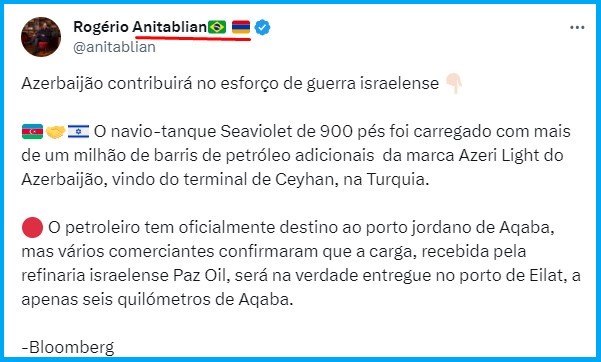
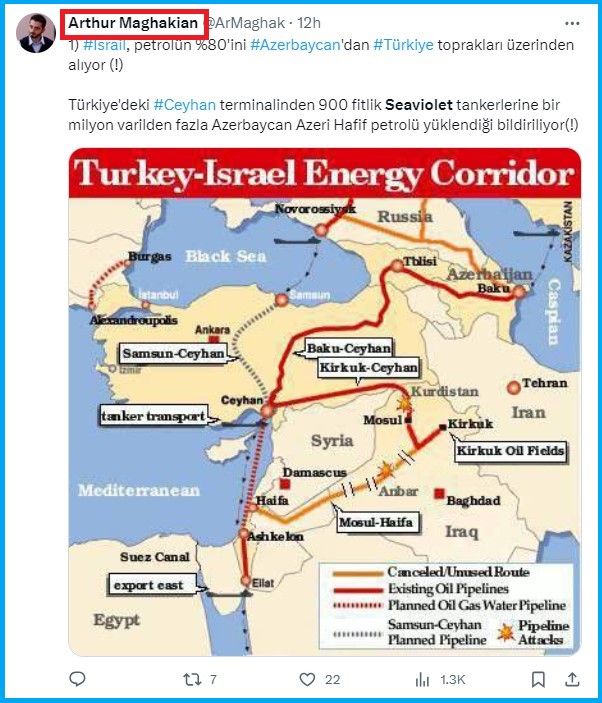
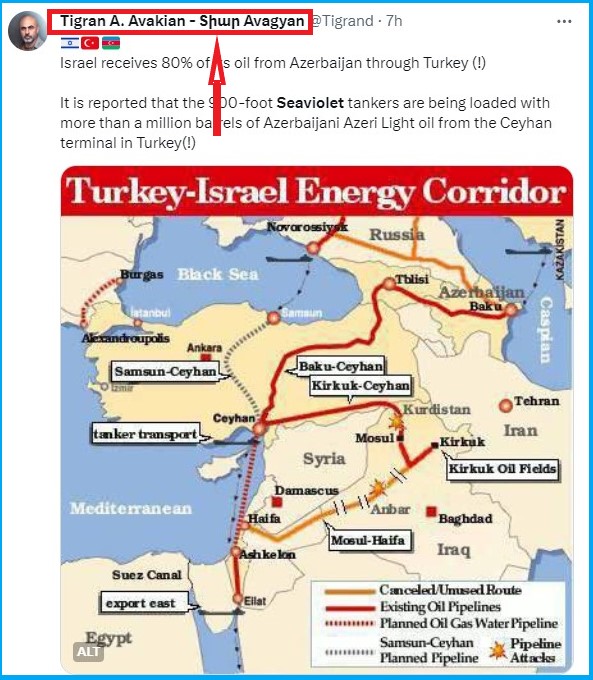
Conclusion:
- The news article of the influential Bloomberg that the Seaviolet crude oil tanker delivered 1 million barrels of Azeri Light Azerbaijani oil from the Ceyhan terminal to the Israeli port of Eilat was prepared without reference to a reliable source.
- The reputable media organization should clarify and refute this issue.
- Azerbaijan has been selling oil to Israel for 18 years, and this is an obligation arising from international agreements. Other Muslim countries are currently continuing their economic cooperation with Israel.




















